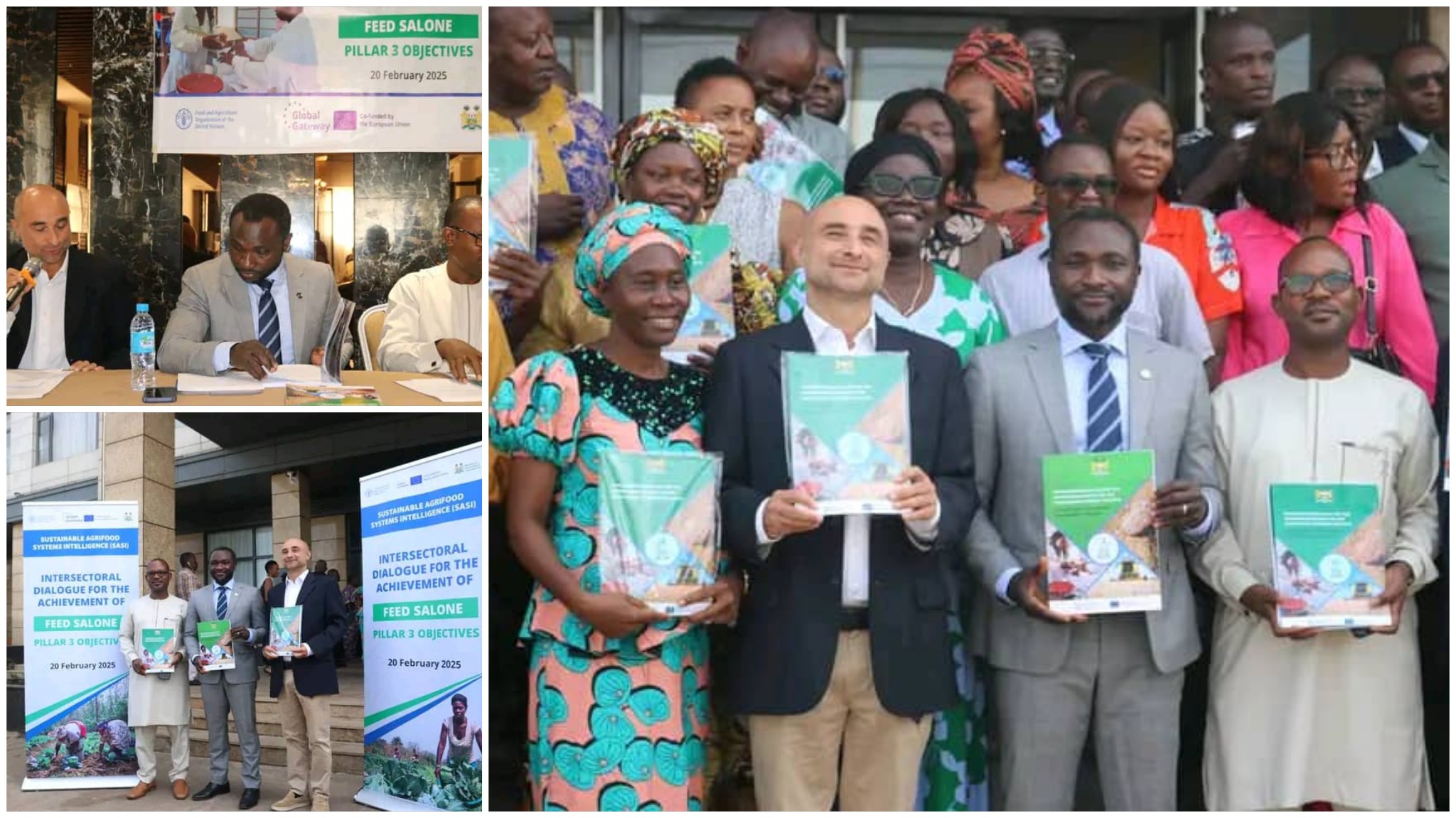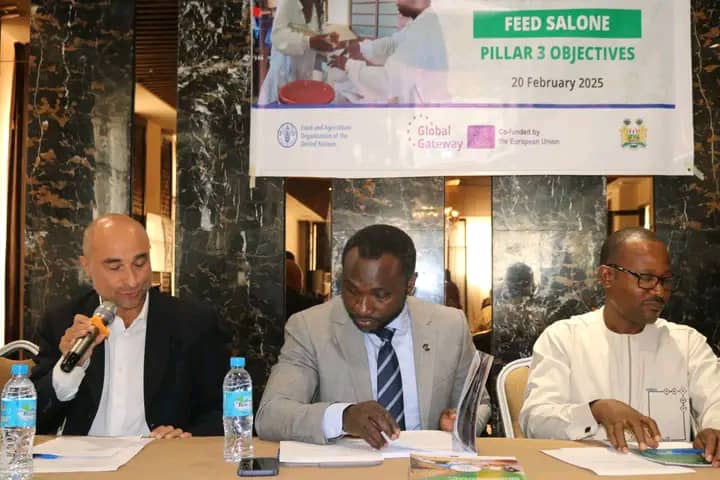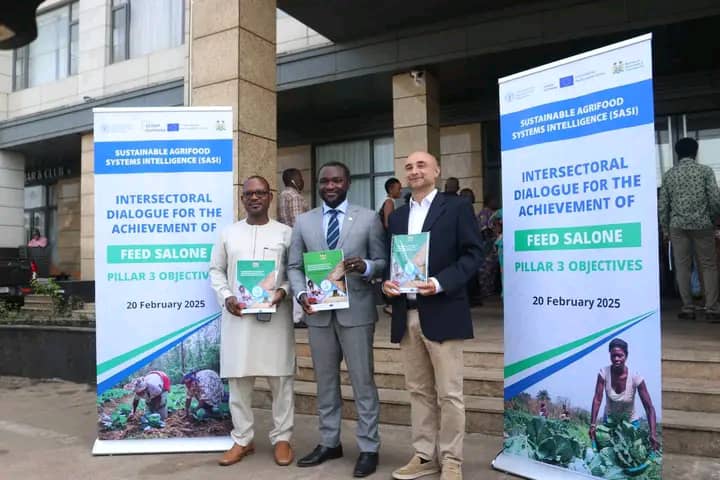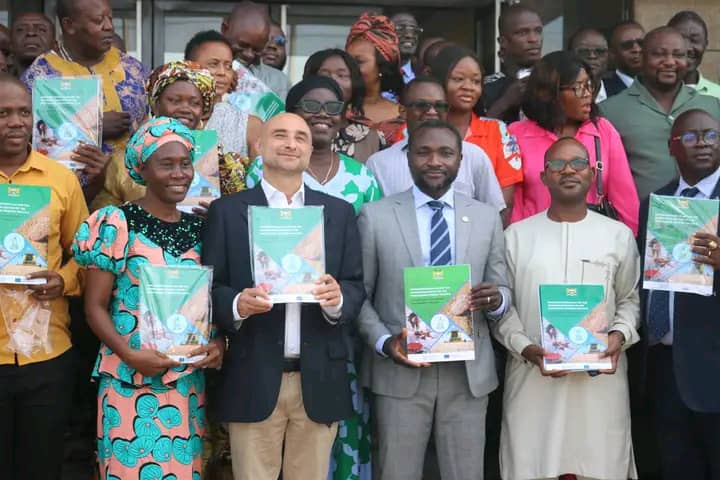
By Alhaji Musa Bah
In a groundbreaking move to redefine its agricultural landscape and address food insecurity, Sierra Leone has officially launched the operational plan for Feed Salone Pillar 3, a key component of the nation’s strategy to transform its agrifood systems.
Stakeholders from government, private agrifood sectors, development organizations, and international partners gathered at the Atlantic Hotel in Freetown on the 20th February, 2025 for a high-profile inter-sectoral dialogue aimed at laying the foundation for a more sustainable and inclusive agricultural sector.
The Feed Salone Strategy, spearheaded by the Ministry of Agriculture and Food Security (MAFS) with technical guidance from the Food and Agriculture Organization of the United Nations (FAO) and financial support from the European Union’s Sustainable Agrifood Systems Intelligence Initiative (SASI), represents a bold and ambitious vision. Focused on Pillar 3—aggregation, processing, and marketing—the strategy seeks to enhance the competitiveness of Sierra Leone’s agrifood products, reduce dependency on imports, and create sustainable livelihoods for millions.

Henry Musa Kpaka, Minister of Agriculture and Food Security, described the initiative as a game-changer for Sierra Leone’s future. “This is a critical moment for us as a nation. We are committed to sustainably transforming the agrifood sector in ways that empower women, youth, and vulnerable groups, while also building resilience in our local production systems. The Feed Salone Strategy is not just about increasing production—it’s about rethinking our value chains to create jobs, foster innovation, and ensure food security for all Sierra Leoneans,” he said.
The operational plan outlines a set of ambitious but achievable goals to be met by 2028:
Expanding the rice sector: Increasing rice milling capacity from 112,000 tonnes to 650,240 tonnes annually, while improving the quality of processed rice and attracting private sector investment.

Boosting egg production: Raising annual production from 3 million to 15 million eggs, with active engagement of women, youth, and persons with disabilities in the poultry value chain.
Enhancing cassava processing: Increasing the share of cassava processed for value-added products to benefit local farmers and businesses.
Scaling onion cultivation: Expanding land under cultivation to meet rising domestic demand.
Promoting cashew exports: Improving the quality of Sierra Leone’s cashew output to penetrate competitive international markets.
A cornerstone of the strategy is its emphasis on private sector-led growth, with a significant role assigned to smallholder farmers, cooperatives, and Micro, Small, and Medium Enterprises (MSMEs). The plan prioritizes inclusivity by ensuring women and youth actively participate in agricultural value chains. It also addresses the rising cost of imported food staples by focusing on local production, particularly rice, which is a staple for most Sierra Leoneans.
FAO Representative in Sierra Leone, Saeed Abubakar Bancie, highlighted the collaborative efforts that brought this vision to life. “This operational plan is the product of meticulous teamwork between FAO, the European Union, MAFS, and other partners. It is both ambitious and grounded in reality. If implemented effectively, it will not only bolster food security but also unlock economic opportunities for all Sierra Leoneans,” Bancie stated during his keynote address.
The European Union, a key partner in the initiative, reiterated its commitment to supporting Sierra Leone in achieving its agrifood transformation goals. Federico Capurro, Food Systems Programme Manager at the EU Delegation, emphasized the EU’s role in ensuring the success of the Feed Salone Strategy. “This initiative aligns perfectly with the EU’s mission to support sustainable and inclusive development in Sierra Leone. We are proud to offer financial and technical support to help the country realize its bold vision,” Capurro remarked.
The dialogue underscored the importance of collaboration among all stakeholders, including government ministries, private enterprises, farmers’ cooperatives, and development agencies. Minister Kpaka issued a rallying call to these groups, urging them to actively participate in the transformation of the agrifood sector.
“This is a collective journey, and everyone has a role to play. From individual farmers to large enterprises, from civil society organizations to development partners—we must work together to ensure the success of this strategy,” Kpaka said.

The operational plan goes beyond food security to address critical issues such as job creation, women’s empowerment, and youth inclusion. By creating a sustainable and inclusive agrifood sector, the strategy seeks to transform the lives of millions of Sierra Leoneans.
FAO’s Bancie aptly summarized the long-term vision: “Our efforts today are not just about feeding the nation; they are about building a resilient agrifood sector that uplifts every Sierra Leonean. Together, we can ensure that no one is left behind in this transformation.”
As Sierra Leone embarks on this bold agrifood revolution, the collaboration and commitment demonstrated by all stakeholders during the Feed Salone Pillar 3 launch offer hope for a brighter, more sustainable future. With a clear roadmap in place, the nation is poised to achieve food security, foster inclusive economic growth, and establish itself as a leader in sustainable agriculture.



